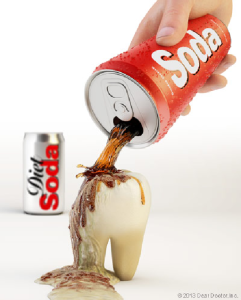Candy, cakes, and other sweet snacks and drinks are composed of LARGE quantities of natural and processed sugars, which are quite acidic too. Equally as important, soft drinks have moved to the top of the list as one of the most substantial dietary sources of tooth decay, affecting people of all ages. All of those acids and sugars in your diet soften your enamel and contribute to the formation of cavities.
 Sugar-free drinks and candies do have less “natural” sugar, but substitute synthetic sugars, which are very acidic and thus still harmful to teeth.
Sugar-free drinks and candies do have less “natural” sugar, but substitute synthetic sugars, which are very acidic and thus still harmful to teeth.
Soft drink consumption in the United States has increased dramatically across all demographic groups, especially among children and teenagers.
Estimates show that at least one in five kids consumes a minimum of four soft drinks per day, with some teenagers drinking as many as 12 a day.
Global sugar consumption for kids increases by about 2% annually and currently sits at 50 million tons per year, which means parents need to be sure their kids teeth are being cared for more than ever. Candy,in addition to hurting children’s teeth, can lead to hyperactivity and weight gain.
Children and teenagers aren’t the only people at risk; long-term consumption of soft drinks has a snowballing effect on tooth enamel, so as people live longer they’re more likely to experience problems.
What You Can Do Now
Everyone can benefit from limiting the amount of sugar they consume, but here are some additional steps you can take:
Substitute beverages –
Stock the refrigerator with drinks that contain less sugar and acid such as water and milk. WATER IS BEST! Drink them yourself as an example and encourage your children to do the same.
Substitute snacks –
Nuts, fruits, vegetables and other healthy, natural snacks are better for your waistline and your teeth.
Rinse your mouth with water –
After drinking a soft drink, rinse your mouth with water to remove any remnants of the drink that can extend exposure of tooth enamel to acids.
Use fluoride toothpaste and mouth rinse –
Fluoride is known to reduce cavities and strengthen tooth enamel, so be sure to brush with a toothpaste that contains fluoride and then rinse with a fluoride mouthwash.
Get a professional fluoride treatment –
Your dental hygienist can put fluoride on your teeth in the form of a foam, gel or rinse.
The bottom line is that heavy sugar intake can damage your teeth. By reducing the amount of sugar you consume and practicing good oral hygiene, you can counteract the damaging effects.
Is it time for a checkup or cleaning? Call our office today to schedule an appointment and so we can fight the effects of sugar together!



